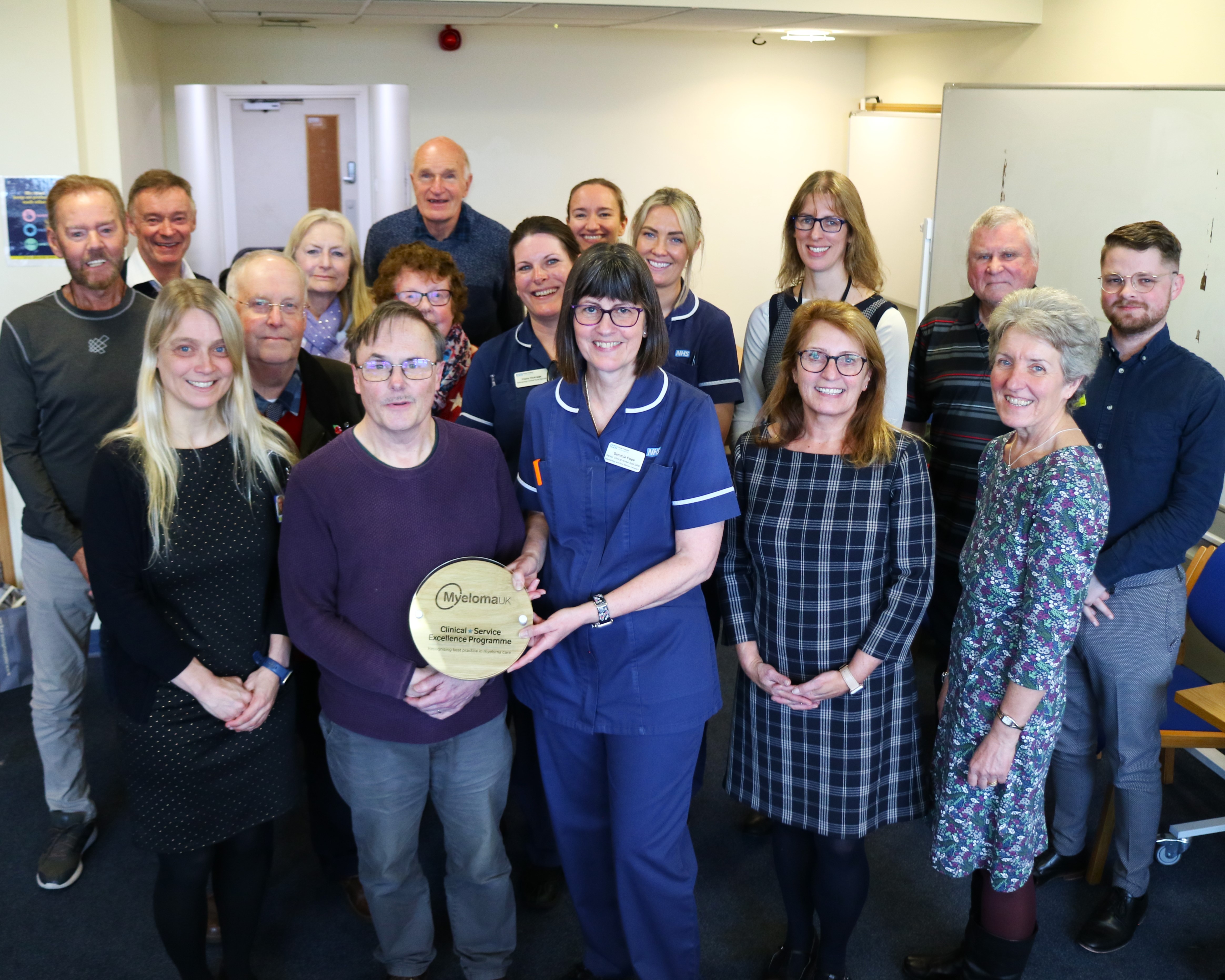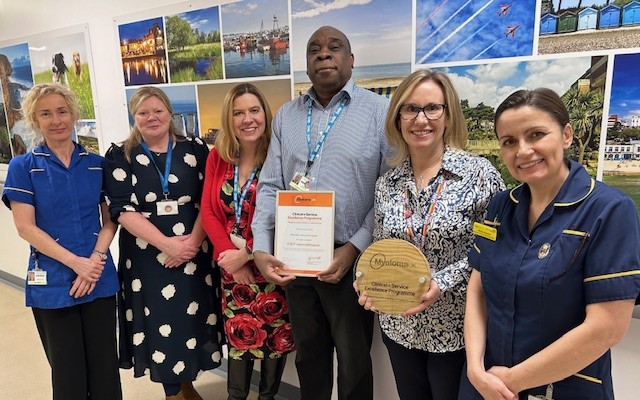'Double joy' for UHD cancer teams
In a month of double joy, both haematology departments at University Hospitals Dorset have earned the prestigious Myeloma UK accreditation.
The haematology team at Poole Hospital was presented with the Myeloma UK Clinical Service Excellence Programme (CSEP) Award by patient, Justin Coldstream, at a special event this month (5 March), in recognition of its outstanding care and dedication to patients with myeloma, an incurable blood cancer which claims the lives of 3,000 people in the UK each year.
with myeloma, an incurable blood cancer which claims the lives of 3,000 people in the UK each year.
This is the second time Poole Hospital has received the award, which is only handed to a select few hospitals every four years. Staff were praised for their efforts to improve patients’ quality of life and eagerness to adapt and listen to their needs.
The accolade, awarded by blood cancer charity Myeloma UK, recognises hospitals’ commitment to raising the bar for treatment and providing compassionate care.
Madeleine Hardy, lead haematology clinical nurse specialist at Poole Hospital, said: “We are delighted to receive the Myeloma UK Excellence Award and feel this is a great testimony to the dedication and hard work by our incredible myeloma team here in Poole who deliver high-quality care every day.
“Of course, our inspiring patients are at the heart of what we do and it is wonderful that some of them attended for the presentation today. We will continue to drive high standards of care and build on this success going forward.”
Myeloma is especially hard to spot as the symptoms are often vague and dismissed as ageing or other minor conditions.
By the time many patients are diagnosed their cancer has often advanced and they require urgent treatment. This can significantly impact their chances of survival and quality of life.
Rhys Owens, clinical practice services senior projects officer at Myeloma UK, said: “Myeloma is a challenging cancer which keeps coming back and can be really difficult to cope with both physically and mentally, so we were hugely impressed with the hospital’s efforts to make patients’ lives that little bit easier.
“People living further afield have the option to be treated from the comfort of their own home thanks to the excellent community oncology nursing team.
“Staff work closely with a range of local services to give patients access to counselling and complementary therapies, including reiki and aromatherapy, and help them through the rollercoaster of cancer treatment.
“The dedicated haematology coffee club also provides patients with a safe space to share their experiences with others affected by myeloma and blood cancer.”
Justin Coldstream, is a father-of-three from Parkstone, and was diagnosed with myeloma in 2016 after months of inexplicable and “horrible” symptoms - he was 56 years old.
By the time his cancer was caught he had holes, known as lesions, in his bones and soft tissue.
Now in remission for the first time, he’s thanked the team at Poole Hospital for supporting him through years of intensive treatment.
“The team have become firm friends on this seven-year long journey,” said the 63-year-old. “I love the way the haematology department stays with you and encourages you all the way through. They’re always there. A lot of people think the world of Poole haematology and I’m one of them.
“You can actually just talk to them as friends – you don’t have to talk about myeloma. If you have issues in your life you can talk around them, you don’t have to stick to medical things. It’s quite nice to feel that they’ve got time for that. It’s much appreciated.”
Myeloma occurs in the bone marrow and currently affects over 24,000 people in the UK.
It is a relapsing-remitting cancer, meaning that although many patients will experience periods of remission following treatment, the disease will inevitably return.
More than half of patients face a wait of over five months to receive the right diagnosis and around a third are diagnosed through A&E.
While it is incurable, myeloma is treatable in the majority of cases.
Treatment is aimed at controlling the disease, relieving the complications and symptoms it causes, and extending and improving patients’ quality of life.
Justin knew something was wrong when he started experiencing “horrible symptoms”, including a “dreadful cold” that led to nosebleeds and muscle pain.
Things finally came to a head when he had a bad reaction to a flu jab.
“I had all sorts of horrible symptoms, which nobody really diagnosed because picking up myeloma is difficult,” said Justin, a member of St Luke’s in Parkstone. “The clincher was that I was getting some really bad respiratory infections. In the autumn I got the most dreadful cold with aching muscles, nosebleeds. I decided to go for a flu jab and I reacted very badly to it. It was a strange feeling that I can’t really explain but my immune system was not doing what it was supposed to do. They picked up the myeloma from that. It was quite aggressive – although they didn’t know that at the time.”
He added: “I hadn’t heard of myeloma. I had to absorb the fact that it was incurable but treatable and very individual. And, a few months down the line, that I had a bad case of it and wasn’t likely to do very well.
“But I started with a positive outlook. It’s been amazing how we, as a family, have kept going through it all. I felt that God and faith would carry me through – that got me through the first few months.”
Although Justin didn’t respond well to his initial and second round treatment, things steadily improved after his third, and he is now in remission for the first time since 2016.
“The induction treatment didn’t really work - the haematology department were really scratching their heads about my case and wondering what to do about me and they rang me while I was on holiday, which was very touching, to tell me they had this treatment lined up you might like to have.”
Although the treatment, DT-PACE, didn’t work as well as the team had hoped, Justin was extremely touched by staff’s unflagging support and determination to keep his cancer at bay.
“It was the thought that counted,” he said. “It was nice to feel that they actually care and take it to heart. I really do feel that. Then I went on what is known as third line treatment and amazingly it turned round and, having faltered, I started to respond to the treatment.”
Crucially, the team have helped him regain a much-needed sense of normality.
“I don’t treat life as though it’s about to end,” he went on. “I do have strong faith so when the time does come, I know where I’m going, which helps. I just try and do what I feel I should do as wholeheartedly as I can.
“It took six and a half years but I am now in remission for the first time. To be on the bad end of things and then to find you’re in remission, I think that’s amazing.”
Royal Bournemouth haematology team and award










